Jason Donenfeld Honored with the ISRG’s Radiant Award
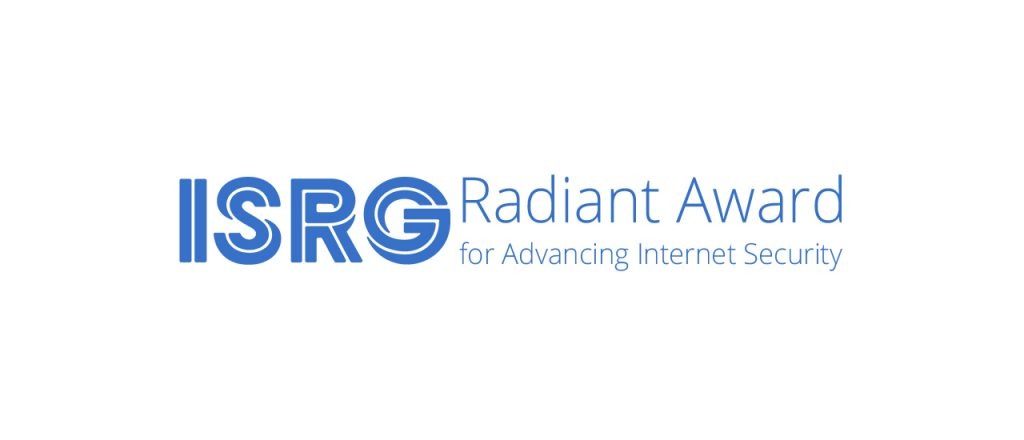
Earlier this week Jason Donenfeld received the Radiant Award from the Internet Security Research Group. Jason is an accomplished engineer and a creative thinker, which makes his work clean, simple, and takes it a step beyond – most notably in WireGuard, an open-source secure VPN tunnel.
 We are proud to have enabled this award. Let me explain why.
We are proud to have enabled this award. Let me explain why.
At the Internet Society we care a great deal about the technologies that help to establish trust between people around the globe, while those people may have never interacted before.
One of the groups we proudly partner with is the Internet Security Research Group, the non-profit behind the Let’s Encrypt initiative. In the 4 years since Let’s Encrypt was launched, it has changed the landscape of web traffic encryption. Whereas in 2014 around 30% of pages loaded by Firefox where loaded over a secure channel, that number has increased to over 75% by now. I believe that rise in secure web traffic is in large part the result of the work by Let’s Encrypt.
Before 2014 it was somewhat costly to get a web certificate, a critical piece of authentication material that is the basis of establishing global trust. Both Continue reading
A New Voice Joins the Chorus: Welcome to the Colombia Chapter!

A new Internet Society Chapter has been founded within the Regional Bureau in Latin America & Caribbean. The creation of the Colombia Chapter is today officially announced at Universidad del Rosario, in Bogotá.
Our desire is to extend a gracious and inclusive welcome to all the 67 founding members that have been active members of the Internet Society for several years, and to the ones that have recently joined the community to be part of the Chapter.
The Chapter invites you to join the live broadcasting starting at 8:00 AM (UTC-5) with eminent guests speakers such as Juanita Rodriguez Kattah, Former Vice Minister of Digital Economy, Hugo Sin Triana, Director of Innovation in Info Projects, Valérie Gauthier, Director of the Department of Applied Mathematics and Computer Science (MACC) at the University of Rosario, Nancy Quiros, the Internet Society’s Chapter Development Manager for Latin America and Caribbean Region, and Javier Pinzon, Member of the Colombian Internet Governance Forum.
The large attendance (approximately 120 participants) at the launching event, speaks to the need for a Chapter to join the Colombian community’s efforts to ensure an open, globally connected, trustworthy and secure Internet for everyone.
The Chapter will encourage the Continue reading
Kindergarten Tech Cop: The Job I Never Wanted

This month, we’ve asked parents to share their experiences of raising kids in the tech age. Today’s guest author is Sara Given, creator of the viral blog “It’s Like They Know Us,” which skewers the myth of the perfect parent. She’s also the author of Parenting Is Easy: You’re Probably Just Doing It Wrong.
“Mom, what’s your passcode?”
I looked up to find my 5-year-old daughter jabbing her finger at my iPhone screen. She continued, “My school iPad has a passcode. What’s yours? I need to take pictures of the cat.”
This was a tame request compared to her other inquiries, (“Can I have a little brother?”), but it bothered me for two reasons: First, I knew that if I gave her that passcode, she would immediately take 5,000 pictures of the floor. And second, I hadn’t considered that at age 5 she’d already be so immersed in technology. That she’d know the lingo. That she probably already had more Instagram followers than me. #floorpics
While my daughter chattered away about the cartoon-character math app she’d been using in class, I found myself facing a dilemma: I want to limit my child’s exposure to Continue reading
The Benin Chapter Wins Chapterthon 2018
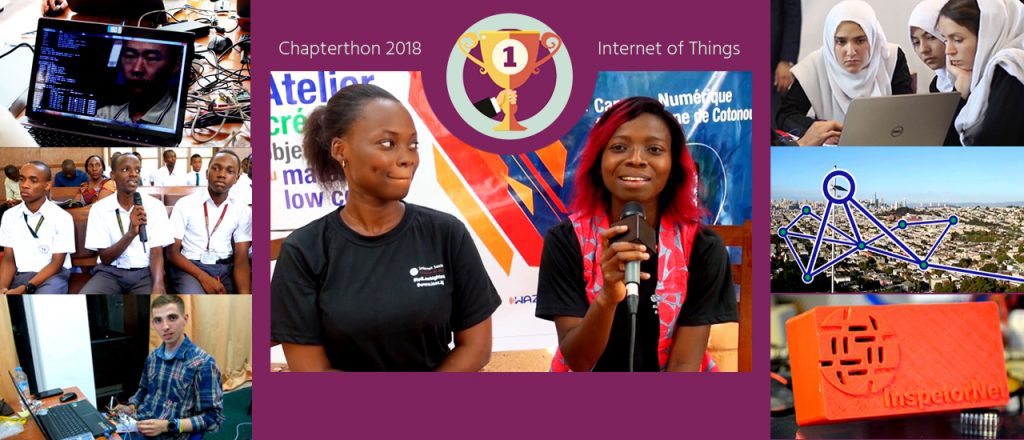
The winner of this year’s Chapterthon was announced this Tuesday, 4 December during InterCommunity 2018.
Chapterthon is a global Internet Society (ISOC) Chapters and Special Interest Groups (SIGs) marathon, where all the Internet Society members can participate by developing a project within a timeline and budget to achieve a common goal. The project winner is selected by the community through online vote.
This year our community worked on the Internet of Things (IoT) – The future is ours to shape.
Every year, the Chapterthon brings enthusiasm and excitement amongst our community. During two and half months, 43 Chapters and Special Interest Groups (SIGs) from across the globe worked alongside to bring awareness on the Internet of Things (IoT) to their communities. They ran over 200 training sessions and workshops, engaging students, entrepreneurs, and local governments. They organized national campaigns, their projects were mentioned in local newspapers, and their message was brought to the most remote places. The Chapters also developed IoT applications that may in the future improve the lives of people in their communities, and amongst some of the projects are improved transport systems, agriculture, energy management, home protection, and healthcare.
The projects that received the highest number Continue reading
Join Us to Discuss Attack Response at Internet Scale
How do we coordinate responses to attacks against Internet infrastructure and users? Internet technology has to scale or it won’t survive for long as the network of networks grows ever larger. But it’s not just the technology, it’s also the people, processes and organisations involved in developing, operating and evolving the Internet that need ways to scale up to the challenges that a growing global network can create.
One such challenge is unwanted traffic, ranging from spam and other forms of messaging-related abuse to multi-gigabit distributed denial of service attacks. Numerous incident response efforts exist to mitigate the effects of these attacks. Some are focused on specific attack types, while others are closed analysis and sharing groups spanning many attack types.
We are helping to bring together operators, researchers, CSIRT team members, service providers, vendors, information sharing and analysis centre members to discuss approaches to coordinating attack response at Internet scale. The Internet Society is sponsoring a two-day “Coordinating Attack Response at Internet Scale (CARIS) Workshop” intended to help build bridges between the many communities working on attack response on the Internet and to foster dialogue about how we can better collaborate.
The workshop will take place on February 28 Continue reading
Bilim Bulagy: A Spring of Knowledge in Kyrgyzstan

Kyrgyzstan’s transition to post-Soviet renovation toward a free market economy has had severe effects on the nation’s educational system. Having limited resources, schools in Kyrgyzstan desperately need more teachers. Currently, there are over 2500 teaching positions not being covered, most of them in the fields of natural science and mathematics.
Aiming to cover the need of affordable education, the Internet Society Kyrgyzstan Chapter developed Spring of Knowledge, a project supported by the Internet Society Beyond the Net Funding Programme, to provide new learning opportunities via digital self-study materials, such as offline access to Wikipedia, the Khan Academy online courses, as well as eBooks and video lessons in local languages.

Isabek Asanbaev,
Project Manager
“The provision of textbooks in schools during the 2013-2014 academic year was only 73%.” explains the project manager Isabek Asanbaev. “The Kyrgyz Republic was ranked last in mathematics, science and reading among nations that participated in the 2006 and 2009 rounds of the Program for International Student Assessment (PISA). The National Sample-Based Achievement Test (NSBA) showed the same trend of underachievement. Our project aims to provide an opportunity for children to continue learning through self study in schools that don’t have enough teachers and Continue reading
Botswana Chapter Digital Literacy Program Seeks to Empower Rural Village Development Committee Leaders
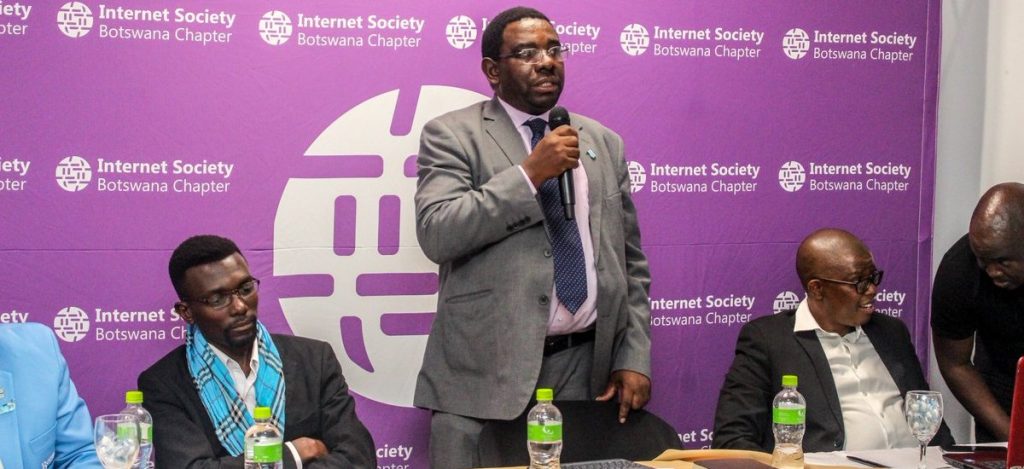
The newly charted ISOC Botswana Chapter is set to spread the Internet Society mandate in Botswana through engagement with relevant stakeholders. The diverse team of technical, communications, and policy practitioners will venture into impact initiatives to complement the Internet Society mission and mandate. As a Beyond the Net 2018 beneficiary, the local chapter is embarking on a project titled: “Internet for Development of Rural Botswana: Empowering Village Development Committees Through Use of the Internet.”
The Village Development Committees (VDCs) are the custodians of community development initiatives. VDCs operate on values of engagement, consultation, and participation and this project hopes to contribute in enhancing these values using the Internet. The digital literacy trainings program is designed to target VDCs leaders in 4 remote regions with the aim of empowering these village leaders with digital tools and resources. VDC Tech Champions will be identified and will be responsible for continued facilitation of the digital literacy training program. To facilitate future support, ISOC Botswana will donate laptops and wireless Internet modems to ensure resources and access.
Beyond the trainings, this project will collect impact stories of the anticipated improvements in VDCs’ operations, relating to digital access and engagement. The hope Continue reading
Nominations Now Open for 2019 Public Interest Registry (PIR) Board of Directors
The Public Interest Registry (PIR) is the non-profit operator of the .ORG, .NGO and .ONG domains. If you or someone you know has the interest and qualifications to help guide the future of PIR, the Internet Society invites you to consider a seat on the PIR Board of Directors.
In 2019 there are three positions opening on the PIR Board. These three directors will serve a 3-year term that begins mid-year 2019 and expires mid-year 2022. Prior board experience is preferred. All directors must be able to read and understand a balance sheet, as well as read and communicate effectively in the English language.
More information about the position, the qualifications, and a link to the nomination form can be found at:
https://www.internetsociety.org/pir/call-for-nominations/
The deadline for nominations is 15:00 UTC on February 4, 2019.
The post Nominations Now Open for 2019 Public Interest Registry (PIR) Board of Directors appeared first on Internet Society.
The Week in Internet News: Huge Data Breach at Hotel Chain
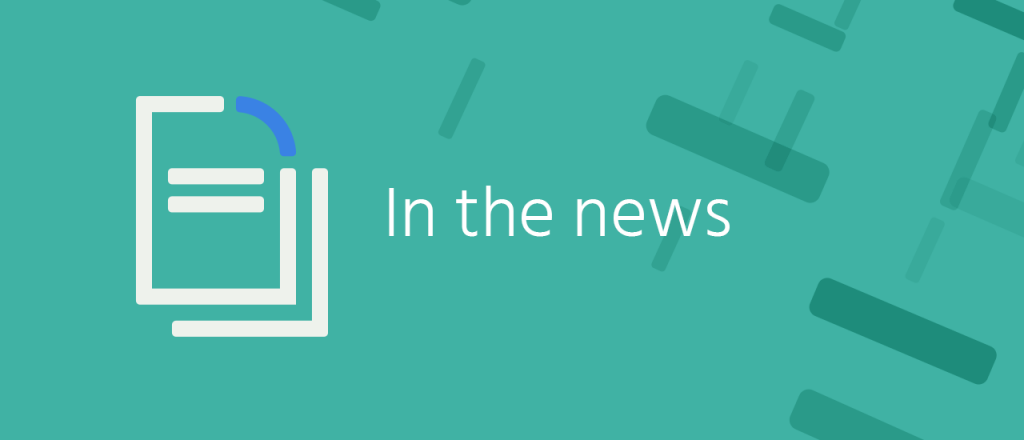
Millions of records stolen: Marriott International, one of the world’s largest hotel chains, has reported a data breach affecting up to 500 million customers, the Washington Post reports. The breached database includes information on guests staying at Sheraton, Westin and St. Regis hotels. The 500 million records lost makes it the second largest data breach reported.
Encryption debate back yet again: U.S. deputy attorney general Rod Rosenstein, best known for overseeing the investigation into President Donald Trump’s ties to Russia, has renewed the Department of Justice’s long-term call for encryption workarounds in tech products, Wired.com reports. Addressing critics of encryption backdoors, Rosenstein said: “Just because people are quick to criticize you does not mean that you are doing the wrong thing. Take it from me.”
Countering view: Meanwhile, Robert Anderson, a former top cyber official at the FBI, said that since leaving the agency and working on cybersecurity issues, he now understands why tech companies would oppose government efforts to break encryption. Companies “entrusted by the clients who have given them information” have a responsibility to protect it, he said in an FCW.com story.
Someone’s watching you: Chinese Internet companies have begun to keep detailed records Continue reading
Customer Data Isn’t Always an Asset: Lessons from the Marriott Data Breach

As data analytics have improved, the massive amounts of data that companies acquire from their customers has only gained in economic value. In the corporate world of today, this data can be a real asset for companies. However, as today’s news, that the records of over 500 million guests of Marriott International’s Starwood division hotels were involved in a data breach, makes clear, corporate thinking about the value of customer data needs to be reevaluated.
Especially when it comes to corporate acquisitions, companies need to start treating customer data as a potential liability, as well as an asset.
In September 2016, Marriott International acquired Starwood for $13.6 billion. When Marriott International sought to buy the Starwood hotel chain, Starwood’s customer data, played a central role in their reasoning for the acquisition. Citing higher income and better brand loyalty among program members, Arne Sorenson, the Marriott CEO, specifically referred to Starwood’s loyalty program as a “central, strategic rationale for the transaction.” Loyalty programs, in addition to attracting repeat customers, also “provide hotels with a wealth of information on their guests” which hotels can use to “create laser focused marketing campaigns for various different kinds of guests.”
While Continue reading
A Critical First Step for IoT Security in Senegal
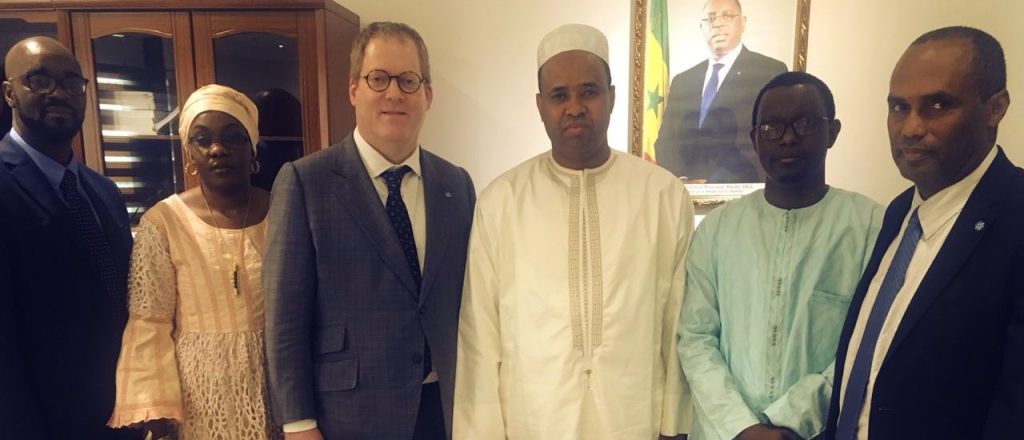
As barriers to entry start to fall, the Internet of Things (IoT) industry could provide Africa with an opportunity to build a brighter economic future.
Several countries are already establishing tech hubs that could supply the infrastructure to fuel IoT, and while there is still a wide gap between the haves and have-nots of Internet access, with more than 60 per cent of Africa still offline, it’s easy to build a case for connectivity.
Mass urbanization is on the rise, and investing in the infrastructure needed to fuel future smart cities and connect more Africans to the opportunity the Internet offers is a logical step forward. But it’s also important that security is in place to support this promising new economy.
Unfortunately, many IoT devices are rushed to market with little thought for basic security and privacy protections. In a world with so many newly connected things, it’s hard for consumers to keep up – and to know if manufactures are protecting their privacy and security.
To address this, Senegal has taken a critical first step. They’ve signed a memorandum of understanding with the Internet Society to strengthen IoT security. Together, they will develop an IoT Security Framework for Senegal Continue reading
New Report: Major Online Retailers Increase Email Marketing Trustworthiness and Follow Unsubscribe Best Practices

Today, the Internet Society’s Online Trust Alliance released its fifth annual Email Marketing & Unsubscribe Audit. OTA researchers analyzed the email marketing practices of 200 of North America’s top online retailers and, based on this analysis, offer prescriptive advice to help marketers provide consumers with choice and control over when and what messages they receive. The Audit assesses the end-to-end user experience from signing up for emails, to receiving emails, to the unsubscribe process and its results.
In the 2018 Audit, seventy-four percent of the top online retailers received “Best of Class” designation, meaning they scored eighty percent or higher in OTA’s analysis of their email marketing. In addition, ten retailers received perfect scores, meaning they adopted all twelve of OTA’s best practices. They are: Dick’s Sporting Goods, Home Depot, Lands’ End, Musician’s Friend, Office Depot, OpticsPlanet, Sierra Trading Post, Staples, Talbots, and Walgreens.
In the subscribe process there were several positive findings. The percentage of sites that had subscribe forms that were easy for the user to find was 94% in 2018, up from 85% in 2017. In addition, one-quarter of sites offered incentives such as free shipping to entice users to subscribe, down slightly from 28% in 2018.
The Third India School on Internet Governance

The third edition of the India School on Internet Governance (inSIG) took place from 13–15 October 2018 at the India International Centre in New Delhi in partnership with the Internet Society Indian Chapters: Delhi, Trivandrum, Mumbai, and Kolkata. It was supported by the Beyond the Net Funding Programme with the participation of Olaf Kolkman, the Internet Society’s Chief Internet Technology Officer.
Ninety participants joined a three day activity event which included workshops, role play exercises and discussions. The event focused on educating emerging leaders from India and other South Asian countries, such as Afghanistan, Bangladesh, Nepal, and Sri Lanka on their role in the global Internet Governance ecosystem.
On 12 October 2018, two events were co-hosted: Firstly, The Internet Infrastructure Security Day, a workshop to learn more on pen Internet standards and sharing good practices as part of the Global Forum on Cyber Expertise (GFCE) – and secondly, India’s first Youth Internet Governance Forum (YIGF), which conducted multiple sessions on topics of relevance to young Internet users, particularly those in secondary school, college, and early employment. Both events were live streamed and viewed by over 1,500 participants.

A range of several industry experts offered insight into India’s Continue reading
2018 Survey on Policy in Asia-Pacific: We Need to Do Something About IoT Security

Earlier this year, we asked Internet users across Asia-Pacific just how secure they thought their smart gadgets were. The findings, gathered from 950 respondents in 22 economies, yielded some interesting insights. Over half of those polled lack confidence that IoT devices are sufficiently secure. A similar percentage feel that they do not have enough information on the security of their device.
As connected devices move into our personal spaces – homes, offices and our bodies – amassing more and more data about us and our activities at a dizzying pace, our report, published last week, highlights how much work still needs to be done to build trust in the Internet of Things (IoT) ecosystem.
Asia-Pacific is undoubtedly a major area of growth for the IoT industry, with countries like China and India rapidly becoming some of the biggest markets for consumer IoT devices. We are also a formidable producer, with established brands like Xiaomi and Samsung churning out wearables, smart appliances, and virtual assistants, and numerous startups joining the fray.
Indeed, the report found that a substantial number of respondents already own IoT devices, with a further 73% planning to purchase an IoT device in the next 12 months. Continue reading
Future Thinking: Payal Malik of the Competition Commission of India
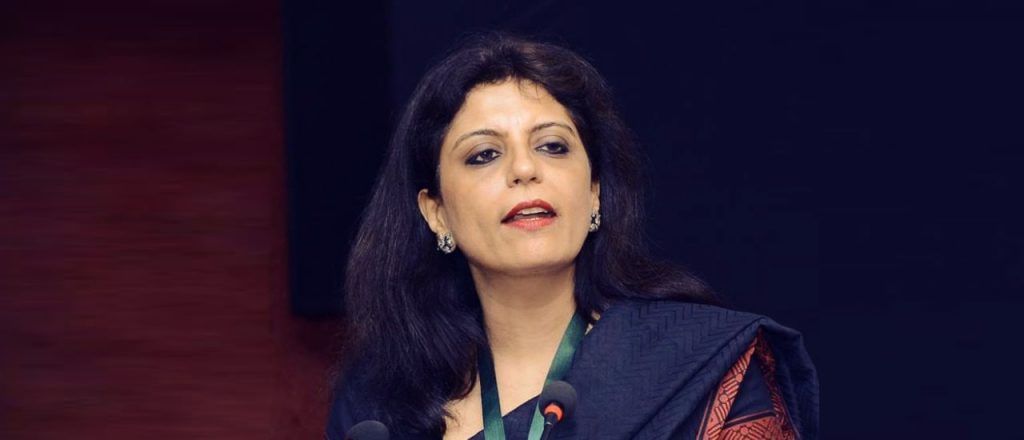
Last year, the Internet Society unveiled the 2017 Global Internet Report: Paths to Our Digital Future. The interactive report identifies the drivers affecting tomorrow’s Internet and their impact on Media & Society, Digital Divides, and Personal Rights & Freedoms. We interviewed Payal Malik to hear her perspective on the forces shaping the Internet’s future.
Payal Malik is the Economics Adviser and Head of the Economics Division (Chief Economist) at the Competition Commission of India. She is on secondment from the University of Delhi, where she is an associate professor of Economics. Her areas of expertise are competition law, policy and regulation. She has many years of economic consulting experience in network industries such as power and telecommunication, information and communication technologies (ICTs), innovation systems, and infrastructure. She was previously a senior research fellow at LIRNEasia and a senior consultant at the Center for Infrastructure and Regulation, National Council of Applied Economic Research (NCAER), India. At NCAER she was a lead researcher on various infrastructure development projects, including telecoms, electricity, highways, and water and sanitation. She was also on the team that drafted the Electricity Act of India, ushering competition into the sector.
The Internet Society: This year we’re focusing our annual Continue reading
The Week in Internet News: France Approves Fake News Law, Looks to Regulate Further
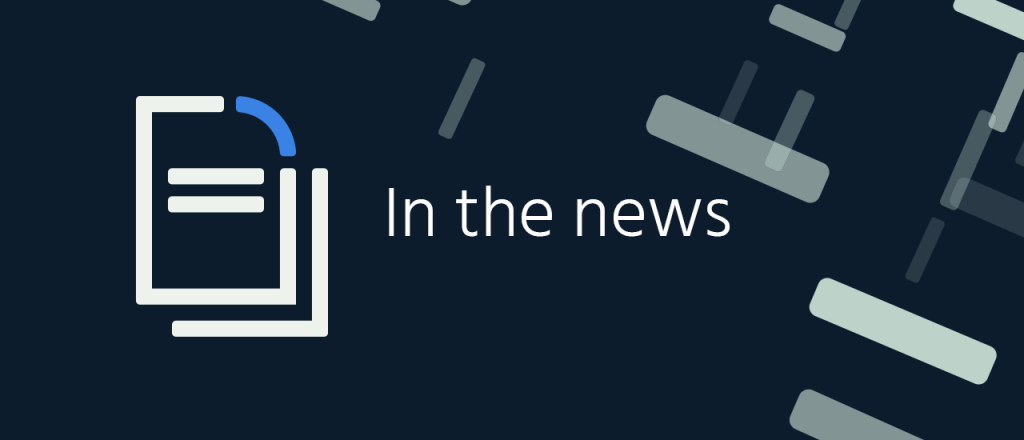
France tackles the Internet: The French government has been making news in recent days for examining ways to regulate the Internet. Its parliament has passed a controversial new law that would allow judges to order the immediate removal of online articles they deem to be fake news, Euronews.com reports. Critics warned the law, which allows for jail sentences for fake news creators, could lead to censorship.
Regulation or autocracy? French President Emmanuel Macron pushed the fake news law, and he also called for more government regulation of the Internet at a recent Internet Governance Forum in Paris. Macron called for international cooperation on Internet issues, as a way to tame disinformation, with CFR.org suggesting governments must adapt to fight modern problems. But TechDirt suggested Macron was acting like an autocrat in his call for more regulation.
Broadband plan MIA: Canada’s government, meanwhile, has “no plan” to bring broadband to rural and remote areas, a government auditor said. Canada’s rural broadband efforts so far have led to “a series of moving targets, lofty proclamations, piecemeal programs, and ultimately big letdowns,” Motherboard says.
Where the money is: Research firm IDC expects investments in Artificial Intelligence to triple in the next three Continue reading
Cybersecurity, Data Protection, and IoT Events in November & December
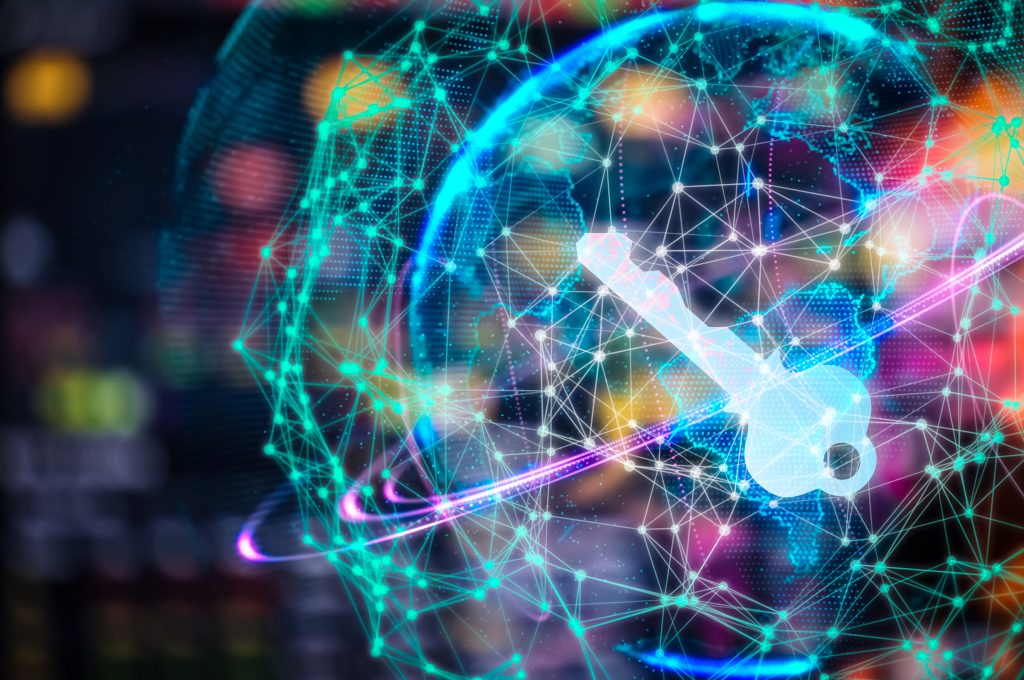
The end of the year has been very busy, with Internet Society staff members speaking at many events on data protection, security-by-design, and the Internet of Things (IoT). First, to recap the last month, you might want to read the Rough Guide to IETF 103, especially Steve Olshansky’s Internet of Things post. Dan York also talked about DNSSEC and the Root KSK Rollover at ICANN 63, and there were several staff members involved in security, privacy, and access discussions at the Internet Governance Forum. In addition, we submitted comments on NIST’s white paper on Internet of Things (IoT) Trust Concerns; the NTIA RFC on Developing the Administration’s Approach to Consumer Privacy; and the NIST draft “Considerations for Managing Internet of Things (IoT) Cybersecurity and Privacy Risks”.
We also have several speaking engagements coming up in the next few weeks. Here’s a quick rundown of the events.
6th National Cybersecurity Conference
27-28 November
Mona, Jamaica
The Mona ICT Policy Centre at CARIMAC, University of the West Indies is hosting the 6th National Cyber Security Conference. The Conference theme this year is “Data Protection – Securing Big Data, Understanding Biometrics and Protecting National ID Systems.” Continue reading
Philippines Department of ICT Sets the Multistakeholder Model into Action

Early this year, we embarked on an initiative with the Philippines Department of ICT (DICT) to co-develop the country’s National ICT Ecosystem Framework (NIEF) in a multistakeholder fashion. The NIEF, which succeeds the Philippine Digital Strategy, will guide the course of ICT use and development, as well as the priority areas for government, until 2022.
Our collaboration builds upon the success of the Philippine Chapter’s work with key stakeholders to advance open Internet development in the country, particularly in the policy sphere, and DICT’s sustained drive to expand avenues for participation in its policy formulation. Just last year, DICT and the Chapter, together with the Foundation for Media Alternatives, spearheaded the first Philippine Internet Governance Colloquium, which has been scaled up to a countrywide roadshow this year to help address pertinent Internet issues in different localities.
Having formalized our partnership in a memorandum of understanding, signed in July by DICT’s Secretary, Eliseo M. Rio, and the Internet Society’s Regional Bureau Director for Asia-Pacific, Rajnesh D. Singh, we pledged to support the DICT in embedding the multistakeholder approach not only in the framework’s development but in its implementation. Our engagement was complemented by an Internet Governance training workshop Continue reading
Africa Needs Its Internet Institutions More Than Ever, Especially AFRINIC
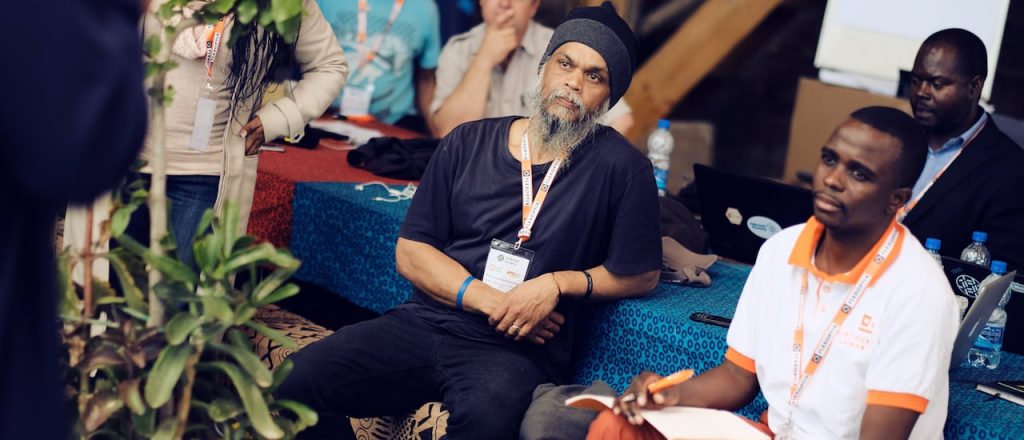
At the recent African IGF in Khartoum, on November 5, participants of the workshop on “Strengthening the Institutional Capacity of Critical African Internet Institutions” hailed the achievements of African Internet institutions in bringing connectivity and broadening access in the last decades. They also recognized their shortcomings and stressed the need to address them so that they continue to serve the continent amidst the potential challenges that it will be facing in the future, as the African Internet grows and more users come online. The workshop was organized by AFTLD, the African Union Commission, and the Internet Society.
Fifteen years ago, Africa had less than 3% Internet penetration and was trailing far behind the rest of the world. Today, with a third of its population connected to the Internet, Africa’s connectedness is still behind but in a much better position than before, since the gap in Africa and the rest of the world has been shrinking. In fact, some countries in Africa have connectivity levels comparable to those of developed countries – something unimaginable fifteen years ago!
The progressive increase in Internet penetration in Africa could not happen without its regional Internet organizations, known as Af*, and the various NOGs (Network Continue reading
Stakeholder Workshop Held to Discuss Tajikistan IXP
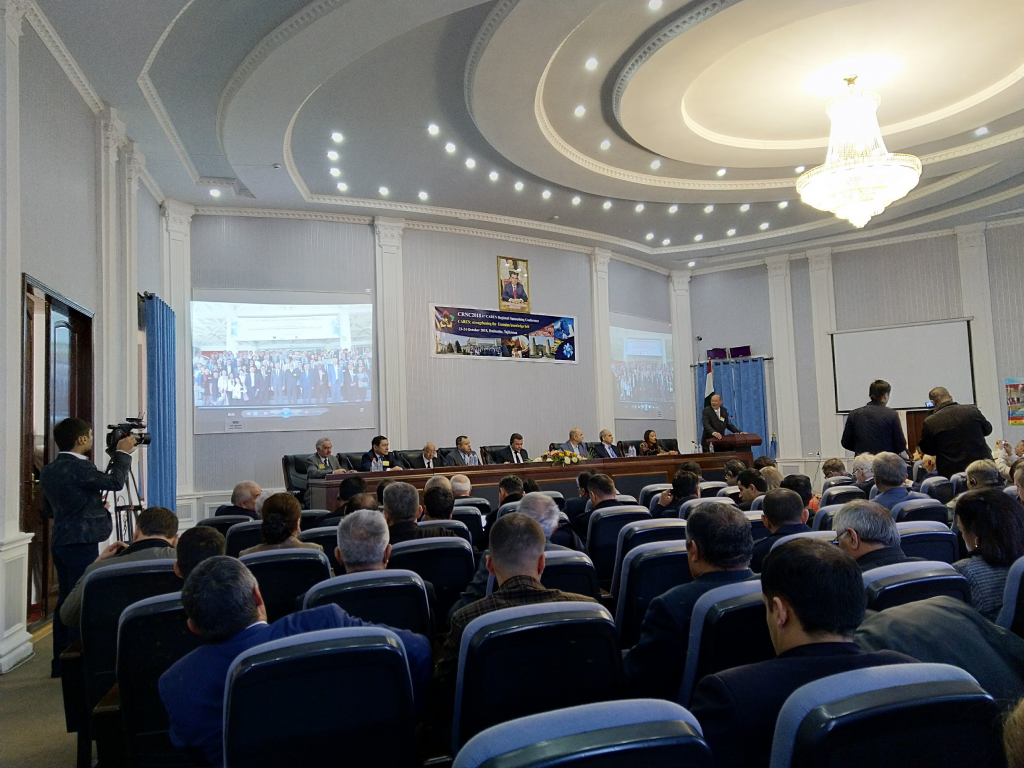
The Internet Society in conjunction with the Open Society Institute Assistance Foundation – Tajikistan and the CAREN3 project organised an IXP workshop on 25 October 2018 at the Center of Written Heritage of the Tajik Academy of Sciences, in Dushanbe, Tajikistan. This followed on from a previous workshop held in 2017, and brought together nearly 30 stakeholders from local ISPs, civil society, and academia to discuss progress on the establishment of an Internet Exchange Point in Tajikistan.
I opened the workshop by summarising the IXP Environment Assessment report for Tajikistan that was commissioned by the Internet Society in 2017. This highlighted that Internet usage was below average for the region, and partly contributed to the low levels of economic growth in the country. The number of Internet users is estimated at between 15-40% of the population, Internet services are costly, and areas outside of the main cities do not have good access to broadband.
Internet uptake and use has been constrained by a variety of different factors, some of which are related to the geographic conditions (such as the landlocked mountainous nature of the country), and these have led to high prices for international capacity, high cost of services for the Continue reading